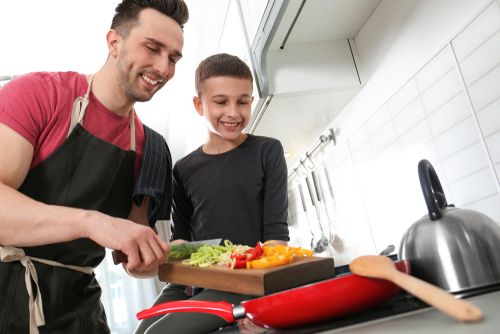 Many people look for ways to turn their favorite recipes into something healthier, and parents often look for tips on sneaking vegetables into the foods their children love. When your kids enter their teen years, though, it is particularly important that the lessons you've taught about healthy food options start to become something they choose for themselves. Here are a few ways you can help them build solid lifelong habits.
Many people look for ways to turn their favorite recipes into something healthier, and parents often look for tips on sneaking vegetables into the foods their children love. When your kids enter their teen years, though, it is particularly important that the lessons you've taught about healthy food options start to become something they choose for themselves. Here are a few ways you can help them build solid lifelong habits.
Start With Knowledge
It makes sense that the food you eat affects how you feel, both physically and emotionally. No one instinctively knows this, though. By drawing your teens' attention to how their bodies and minds react to different nutritional choices, you can help guide their behavior without coming across in a way they may interpret as preachy.
This may be easier if your teens are involved in some type of sport. Chances are that their coaches have already broached the subject of food as fuel, especially when they're at the height of training. Even if their extracurricular activities are less physically active, though, you can still help them notice when they're feeling sluggish or grumpy and recommend a healthy snack to see if that helps. Pretty soon, you may be delighted to find your teens seeking out such nourishment on their own when they need it.
Plan Together
One of the great things about your kids getting older is that they can take on more responsibilities around the home. Helping out with meal planning and preparation can be one of those tasks. In fact, you may decide to include everyone in the conversation. Incorporating the whole family's input can cut down on both complaints and food waste.
Set aside extra time for the first few meal-planning sessions. It may seem like more for you to do at first, but don't let that discourage you. Once your teens start helping with the planning process, it will be easier to get them to help with the prep work too. The extra work you do at the beginning will likely pay off in the long run.
Delegate Responsibilities
A nice part of sharing meal-planning duties is that it naturally progresses into sharing the workload of preparing food. After all, if teens pick their favorite fruits and vegetable to have around as snacks, it only makes sense that they should be in charge of chopping them up so that they're ready for them to eat throughout the week. As an added bonus, when they see how much work they put into preparing food, they are less likely to waste it or take it for granted.
Even if your teens don't have a lot of cooking experience, there are several ways they can learn to be more comfortable in the kitchen by helping with daily duties:
- Chopping vegetables
- Measuring ingredients for the main course
- Preparing a side dish or salad
- Setting the table
- Washing dishes
Once they become more confident, consider designating a night for them to be in charge of the whole meal. Not only does this take a task off your plate and give you a much-needed night off, but it also helps them learn to feed themselves and others.
Discuss Budgets
No meal-planning lessons are complete without looking at what it all costs. Another perk of getting your teens involved in planning and preparing food is that it opens their eyes to how much they can expect to spend on groceries when they are on their own. Learning this lesson while they're still living at home with you can help ease them into their approaching adulthood.
When you are making all of your kids' food choices for them, it's easy to sneak in healthier options. As they get older, though, they need to start making good decisions for themselves. Getting them involved in planning and preparing meals is a great way to teach these important life lessons.



